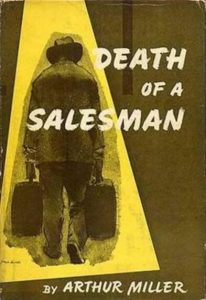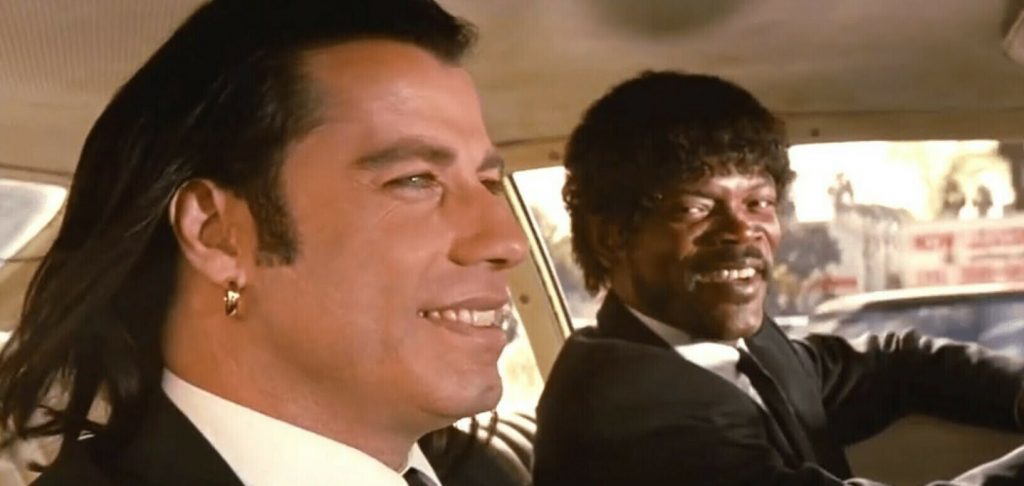“All we ask is that an actor on the stage live in accordance with natural laws.” — Konstantin Stanislavski
Here are a few things that bug me when I see them in a movie. Allow me to get them off my chest.
First off, let’s think about things that are heavy – luggage and packages and other things that get carried, thrown, or otherwise moved from one place to another. The audience can tell the difference between a full suitcase and an empty one, simply by seeing how the actor interacts with it. The audience will not be fooled.

Think about the great actors who have played Willy Loman, the self-deluded traveling salesman in Death of a Salesman. Willy carried cases of samples to show his customers. Arthur Miller never told us what Willy sold; some people speculate it was only lingerie and socks, but whatever it was, Willy’s sample cases were big and packed tight full, and they were HEAVY, you could tell by the way they pulled his arms straight down and rounded his shoulders and put a bend in his back. That wasn’t acting, it was gravity.
Willy Loman didn’t bob along swinging his arms as he walked, he couldn’t. If you are putting on a production of Death of a Salesman or some other work where there’s luggage or bags of ransom money or anything else that has real weight, you need to go and get 60 or 80 or 100 pounds of yesterday’s newspapers to make that weight be real.
Relatedly, in the movie Three Kings, each of the stolen gold bars is roughly the size of a carton of cigarettes, and the actors handle the bars as though gold and tobacco weigh the same. THEY DO NOT. A bar of gold that size would weigh about 60 pounds, so your actors shouldn’t be handing them off to each other as though they’re shaking hands. As a moviegoer, how am I supposed to suspend disbelief when I see something like that on the screen?
The f-word: Whatever happened to the word “hell”? Where has it gone? Scene: A young suburban husband comes home and sees his wife is working on, say, a semi-abstract painting. It is not very good. Instead of having him jokingly ask “What the hell is that? “, or even the softer “What the heck is that?”, he asks “What the fuck is that?” and the joking is over. Point: The f-word does not fit in everywhere. Unless you’re Quentin Tarantino or some other writer with a great ear for dialog, which you are probably not, take it easy with the f-word. Also, remember that in the real world, a person of lesser authority will cut back on f-words when a person of greater authority is present.
Some of the best dialog ever written comes from The Sopranos, but even those writers go over the top sometimes. I have known some real-life lowlifes, and in general they did not use more than one f-word in a single sentence, or more than ten in a single speech. IT JUST DOESN’T RING TRUE. Getting back to “hell”, when’s the last time you heard a Sopranos character say “hell”?
I suggest not trying to write working-class dialog until ypu have worked a while as a member of the working class. Listen closely. Make notes.
Read your dialog out loud. Can you imagine a real person, in the real world, ever saying those words to anyone? People don’t just spout words; they assemble sentences that make sense, it’s not poetry, but it’s an ability we begin developing at age two, and we know when it sounds fake. Does it sound fake? REWRITE. Does it lack a realistic pace and cadence? REHEARSE SOME MORE.

In-car conversation: when we see two actors having a conversation in a moving car, we know the car is actually on a low-slung trailer being towed through the scenery by a professional. The actor “driving” isn’t really driving at all, but he needs to LOOK like he’s driving. That means not engaging with the passenger as if they’re seated in a living room somewhere. Drivers, drive! Adjust the steering wheel to stay in your lane. Turn the wheel as you get towed around a corner. Yes, glance at your companion, but keep your eyes on the road, so the audience isn’t always anticipating a collision.
Lastly, our mothers taught us to look for traffic before we cross the street. Teach your actors to do the same. I always think “BAM!” and expect a plot twist in 3 – 2 – 1 when I see an actor walk into the street without looking.
Thanks for listening. See you in the movies!
